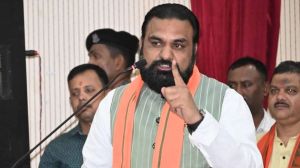Talaq-E-Hasan divorce explained: While hearing a PIL challenging the constitutional validity of Talaq-e-Hasan, a customary way among Muslims for granting divorce, the Supreme Court questioned the prevalence of the practice in the present day and age, asking if it should be allowed in a civilised society.
The case stems from a PIL filed by journalist Benazeer Heena, who contended that the practice is “irrational, arbitrary and violative” of several constitutional provisions.

The Indian Express spoke to advocate Misbah Solkar to understand the various legal dimensions of Talaq-e-Hasan; its impact on Muslim women and its relevance after talaq-e-biddat (triple talaq) was declared unconstitutional by the top court in 2017.
Excerpts follow:
What is talaq-e hasan and what is its origin?
Solkar: Talaq-e-hassan is basically a form of divorce in Islam. The roots are, of course, in the Quran and in our culture that is rooted back centuries. Talaq-e-Hasan basically is a revocable form of divorce where you need three months, three consecutive periods wherein, in one month, the husband can pronounce talaq in person to the wife.
It is not irrevocable as opposed to the triple talaq, which is already an offence in India and is also unconstitutional now.
Can a husband validly pronounce Talaq-e-Hasan through WhatsApp or via other electronic communication?
Solkar: Absolutely not. That is against the Sharia and not even the procedure to be followed according to the Sharia. According to law, it’s bad anyway. Like according to law, sending it to someone else, a third party who is not involved in the divorce. That is absolutely wrong.
Is Talaq-e-Hasan recognised under Muslim personal law in India, and is it considered a valid method of divorce?
Solkar: Absolutely. It is considered a valid form of divorce because it is quite similar to our other laws also for Hindus and for Christians because, per se, Hinduism does not have a code of conduct where they have set rules for divorce and marriage as they consider marriage to be so sacred that you cannot come out of it at all and then the courts had to interfere in cases where two individuals just cannot live with each other and they have to, unfortunately, come out of an abusive marriage or any kind of marriage and hence this is why the courts came into picture and it is very similar.
In today’s context, how prevalent is the practice of Talaq-e-Hasan in India?
Solkar: I think more often than not, it is mostly talaq-e-hasan and talaq-e-ahsan (single pronouncement). Initially, it was talaq-e-biddat, because a lot of men would take advantage of this situation like they just get aggressive and pronounce talaq right and it’s over. I think it isn’t fair on the part of women.
Story continues below this ad
Does Talaq-e-Hasan safeguard the rights of Muslim women? If so, in what ways does the procedure aim to protect their interests?
Solkar: It does. It does protect as opposed to talaq-e-biddat because here, it is revocable.
Most importantly, like any other law of the country governing other religions, it is the same which works in our favour because during the cooling-off period, if there is a possibility of reconciliation, then both the parties can benefit from it. The woman as well as the man.
Therefore, I don’t think women’s rights are really hampered because both parties equally have that opportunity to reconcile.
And by the end of it, if both parties are not reconciling, of course, you are going ahead with the divorce. Although in the present case, I would say yes because they have not followed the law. They have not followed the Sharia also and as per their convenience, they have just pronounced it. That shouldn’t be the case.
Story continues below this ad
It shouldn’t be a matter of convenience for the man.
How has the Indian judiciary dealt with cases involving Talaq-e-Hasan in recent years?
Solkar: The courts have been dealing with it very nicely to be very honest and fair. As far as the courts are concerned, they have considered it properly. They have understood our rights also.
The women-centric laws are there, irrespective of religion. If the right of a woman is not established, then the courts will come into the picture and take care of it.
India is a diverse country with centuries of culture going on. So, now when it comes to modern society, it will definitely create some sort of friction because these laws were generated centuries ago.
Story continues below this ad
So it is very important for the Constitution to interfere and protect individual rights. Along with securing the personal laws as well, which is so deep-rooted.
Are there any methods of divorce available to the wife under Muslim personal law?
Solkar: Women have also been granted the right to obtain a divorce under Muslim personal law, and that is through “khula”. In a khula, the woman can take a divorce and leave. She has full rights and also she doesn’t have to give like three notices. She doesn’t have to wait for any reconciliation.
How does talaq-e-hasan fare in the light of talaq-e-biddat being held unconstitutional among the practicing muslim community?
Solkar: I think the women are quite secure. They feel secure from unscrupulous usage of talaq-e-biddat because a lot of men have forgotten the true essence of what it was and what it stood for in the ancient times.
Today, it’s misused to such an extent, that is why the courts had to intervene and stop its usage because they had lost the essence, the importance, the understanding of talaq-e-biddat, and its true sense and meaning.

































